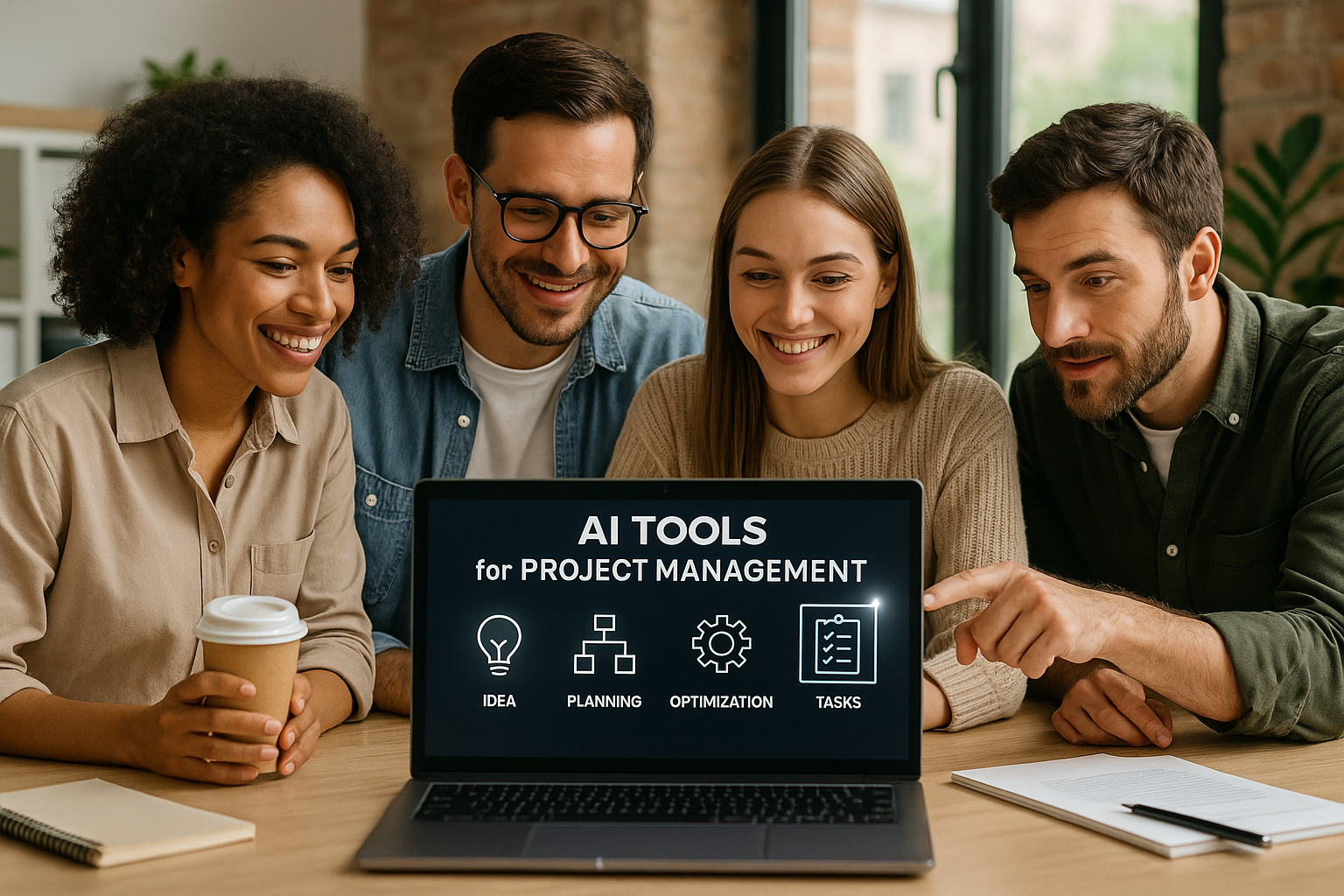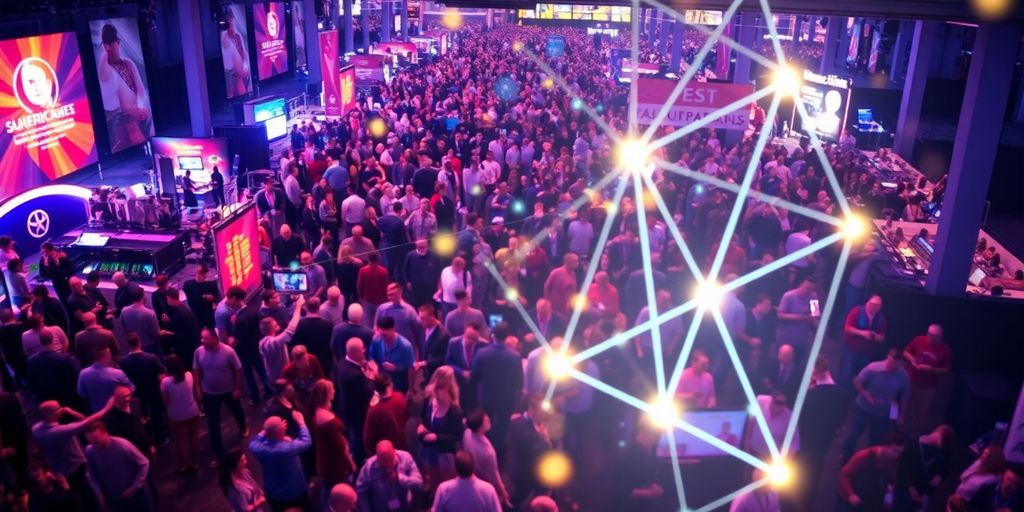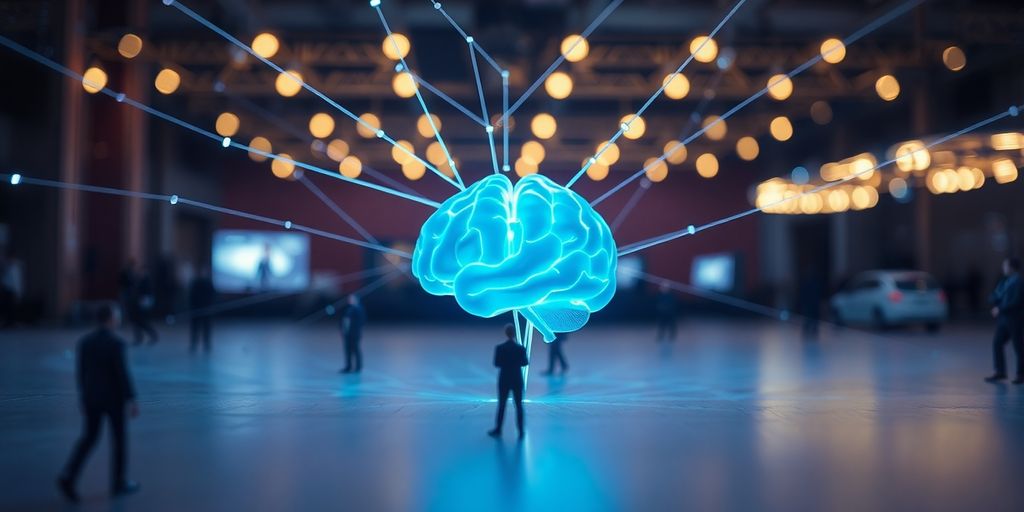Register as an organizer
Click the button below and finish your organizer registration, or fill out the form and we will be in touch to assist you.

Planning big events can be a real headache. There are so many moving parts, from figuring out who needs to be where, to making sure you have enough stuff, and then dealing with all the last-minute changes. It's easy to get swamped. But what if there was a way to make all that easier? That's where AI comes in. We're talking about AI schedule optimization for multi-day events. It's like having a super smart assistant that can handle all the tricky bits, making sure your event runs smoothly, no matter what pops up.
AI is changing the game for event planners. Forget endless spreadsheets and constant phone calls – AI tools are stepping in to handle the heavy lifting. It's not just about making things easier; it's about making them better. We're talking smarter decisions, smoother execution, and happier attendees. Let's explore how AI is revolutionizing event planning.
Predictive analytics is a game-changer. Instead of guessing what might happen, AI can analyze past event data to forecast attendance, identify potential bottlenecks, and even predict which sessions will be most popular. This allows event planners to make informed decisions about resource allocation, staffing, and marketing strategies. Imagine knowing, with a high degree of certainty, how many vegetarian meals to order or how many ushers you'll need at a specific time. It's like having a crystal ball, but based on data, not magic. This is more than just basic calendar management; it's about anticipating needs and proactively addressing them.
Scheduling a large event can feel like solving a Rubik's Cube blindfolded. There are so many moving parts: speakers, venues, equipment, staff, and attendees, all with their own constraints and preferences. AI can automate much of this process, finding optimal schedules that minimize conflicts, maximize resource utilization, and accommodate everyone's needs. Think of it as a super-powered assistant that never gets tired of juggling details. Here's how it helps:
Multi-day events are notorious for unexpected changes. A speaker gets sick, a room becomes unavailable, or a session runs over time. Traditional scheduling methods struggle to adapt to these disruptions, leading to chaos and frustration. AI-powered scheduling tools can respond to changes in real-time, automatically adjusting schedules, reallocating resources, and notifying attendees of any updates. It's like having a virtual scheduling assistant that's always on call, ready to handle whatever comes its way.
AI's ability to adapt to real-time changes is a game-changer for multi-day events. It allows event planners to stay in control, even when things don't go according to plan. This level of flexibility is simply not possible with traditional scheduling methods.
Construction projects rarely go exactly as planned. Unexpected delays, material shortages, and weather changes can throw a wrench into even the most carefully crafted schedules. That's where dynamic scheduling, powered by AI, comes in. It's about creating schedules that can adapt and change in real-time, keeping projects on track despite the inevitable surprises.
AI can analyze historical data, current site conditions, and even external factors like weather forecasts to predict potential delays before they happen. For example, if the forecast predicts heavy rain next week, the AI can automatically reschedule outdoor tasks and prioritize indoor work. This proactive approach helps minimize downtime and keeps the project moving forward. This is more than just guessing; it's data-driven decision-making.
Instead of relying on a single, rigid schedule, AI can generate multiple schedule scenarios, each accounting for different constraints and priorities. Need to finish the project as quickly as possible? The AI can create a schedule that prioritizes speed, even if it means higher costs. Looking to minimize expenses? The AI can generate a cost-optimized schedule, even if it takes a bit longer. This flexibility allows project managers to make informed decisions and choose the best path forward.
Dynamic scheduling isn't just about reacting to problems; it's about staying in control when things get chaotic. By continuously monitoring progress, identifying potential risks, and automatically adjusting the schedule as needed, AI helps project managers maintain a clear view of the project's status and make informed decisions.
With dynamic scheduling, you're not just reacting to problems; you're anticipating them and taking proactive steps to mitigate their impact. This helps minimize disruptions, keep the project on track, and ultimately deliver better results.
Here's a simple example of how AI can help:

Large events demand careful resource management. It's not just about having enough; it's about having the right stuff, in the right place, at the right time. This is where AI can really shine, helping to streamline processes and cut costs.
AI can help optimize labor and equipment allocation by predicting demand. Think about it: instead of overstaffing based on a worst-case scenario, AI analyzes historical data to forecast actual needs. This means fewer idle hands and less unused equipment sitting around. For example, Powerdrill AI can forecast future trends from historical data, optimizing resource allocation for event planners. This leads to significant cost savings and improved efficiency.
Getting materials on time and within budget is a constant challenge. AI can analyze vendor performance, predict material costs, and optimize delivery schedules. This helps avoid delays, reduces waste, and ensures you're getting the best possible prices. It's about making smarter decisions, not just reacting to problems as they arise.
Using AI for material procurement means you can anticipate potential supply chain disruptions and proactively find alternative sources. This level of foresight is invaluable in preventing costly delays and keeping your event on track.
Downtime is the enemy of any large event. Whether it's equipment malfunctions or logistical bottlenecks, any interruption can throw off the entire schedule. AI can help minimize downtime by predicting potential problems and optimizing workflows. Predictive maintenance on equipment, for example, can prevent breakdowns before they happen. This proactive approach keeps things running smoothly and maximizes productivity.
Event planning, especially for large, multi-day events, can quickly turn into a communication nightmare. Keeping everyone on the same page, from staff to vendors to attendees, is critical for success. AI tools are changing how event organizers handle this challenge, making it easier to keep everyone informed and connected.
AI-powered scheduling tools aren't islands; they play well with others. The best ones integrate directly with the communication platforms you already use, like Slack, Microsoft Teams, and email. This means you can schedule meetings, send updates, and share important information without switching between different apps. It's all about streamlining the process and reducing the chances of miscommunication.
Imagine trying to manually update hundreds of people every time there's a change to the schedule. Sounds awful, right? AI can automate this. When a session time changes, a speaker cancels, or a room gets moved, the system automatically sends notifications to everyone who needs to know. This keeps attendees informed, prevents confusion, and reduces the number of questions your team has to answer.
Different teams need different information. The catering team needs to know about meal times and counts, while the AV team needs to know about equipment setups and sound checks. AI can help you segment information and deliver it to the right people at the right time. This ensures that everyone has the information they need to do their jobs effectively, without being overwhelmed by irrelevant details.
Think of it as having a central nervous system for your event. Information flows smoothly and efficiently, allowing you to react quickly to any changes or challenges that arise. This level of coordination is simply impossible to achieve with manual methods.
Here's a simple example of how AI can streamline information flow:
AI isn't just about planning; it's about doing. These tools are designed to make the actual event run smoother than ever before. Think of it as having a super-efficient assistant handling all the nitty-gritty details in real-time.
Scheduler AI is like having a personal assistant dedicated to managing your calendar and meetings. It takes the headache out of scheduling, rescheduling, and coordinating with attendees. I've found it especially useful for large events where keeping track of everyone's availability can become a logistical nightmare. It integrates with email and other platforms, so you can schedule meetings directly from where you're already working. It's a real time-saver.
Forget complicated commands or menus. With Natural Language Processing (NLP), you can simply tell the AI what you need in plain English. Want to schedule a meeting with the catering team next Tuesday? Just type it in. The AI understands your request and takes care of the rest. It's like talking to a human assistant, but without the coffee breaks. This makes event AI accessible to everyone, regardless of their technical skills.
Things change, especially during multi-day events. A speaker might get delayed, a venue might become unavailable, or a key staff member might call in sick. Instead of scrambling to find a solution, the AI can automatically reschedule affected sessions and suggest alternative times based on everyone's availability. It's like having a safety net that catches you before you fall. This feature alone can save hours of stress and prevent major disruptions. Here's a quick look at how it works:
AI-powered tools are not just about automation; they're about empowerment. They give event planners the ability to handle unexpected challenges with grace and efficiency, ensuring that every event runs as smoothly as possible.
These tools are designed to work together, creating a cohesive and efficient event execution system. They free up your time and energy, allowing you to focus on the bigger picture and deliver an unforgettable experience for your attendees. Think of it as moving beyond basic calendar management and embracing a new era of event execution.

AI scheduling assistants are becoming more sophisticated, offering features that go way beyond simple calendar management. They're designed to make planning and executing large events much easier. Let's take a look at some of the key things these tools can do.
One of the coolest things about advanced AI is its ability to predict potential problems. These systems analyze historical data and current conditions to forecast delays, resource shortages, or other issues that could impact your event schedule. For example, if a certain vendor is consistently late, the AI will learn this pattern and adjust the schedule accordingly. This lets you address problems before they even happen, keeping your event on track. It's like having a crystal ball, but based on data!
What if it rains? What if half the staff calls out sick? Instead of panicking, AI scheduling assistants can generate multiple schedule scenarios to help you prepare for the unexpected. These scenarios consider different variables and their potential impact on the event. You can then evaluate each scenario and choose the best course of action. This feature is a game-changer for event planning, allowing you to make informed decisions based on data rather than gut feelings.
An AI scheduling assistant is only as good as its ability to work with your existing tools. The best systems integrate with a wide range of platforms, including:
This integration allows for a smooth flow of information and eliminates the need for manual data entry. It also ensures that everyone is on the same page, reducing the risk of miscommunication and errors. The ability to connect with other apps, like Zoom, to generate meeting links is also a plus.
This connectivity is key to maximizing the benefits of AI scheduling. It's not just about automating tasks; it's about creating a connected ecosystem that streamlines your entire event planning process.
It's pretty clear that AI is changing how we plan events, especially the big, multi-day ones. We're moving way beyond just using calendars to block out time. Think about it: AI can learn from past events, adapt to changes in real-time, and even predict potential problems before they happen. It's like having a super-smart assistant that never sleeps.
We're talking about more than just digital calendars here. AI is taking over the tedious parts of scheduling, like finding the best time for everyone, booking rooms, and making sure resources are available. This means event planners can focus on the creative stuff, like making the event amazing for attendees, instead of getting bogged down in logistics. AI can handle the repetitive tasks, freeing up time for strategic planning and innovation.
AI isn't just a one-time setup; it gets smarter over time. The more data it processes from different events, the better it becomes at predicting potential issues and optimizing schedules. This continuous learning means that each event benefits from the experiences of previous ones, leading to smoother operations and better outcomes. It's like the AI is constantly going to school, learning new tricks and improving its skills.
Ultimately, the goal is to make events more efficient and get a better return on investment. AI can help reduce costs by optimizing resource allocation, minimizing downtime, and preventing delays. It can also improve the attendee experience by ensuring that everything runs smoothly and that everyone has access to the information they need.
By using AI to its full potential, event planners can create events that are not only successful but also sustainable and scalable. The future of event planning is all about using technology to make things easier, more efficient, and more enjoyable for everyone involved.
Here's a simple example of how AI could improve efficiency:

So, there you have it. AI tools are really changing how we plan big events. They help with all the tricky parts, making sure everything runs smoother and you don't get bogged down in tiny details. Think about it: less stress, fewer last-minute problems, and more time to actually make your event awesome. It's not about replacing people, but giving us better tools to do our jobs. If you're still doing things the old way, you might be missing out. Giving these AI helpers a try could really make a difference for your next big event.
AI helps event planners by looking at lots of past information to guess what might happen in the future. It can help set up schedules, manage tasks, and make sure everything runs smoothly even if things change unexpectedly. This makes planning big events much easier and less stressful.
AI can predict problems like bad weather or late deliveries by looking at many different pieces of information. If it sees a problem coming, it can quickly change the schedule to avoid delays, keeping your event on track.
Yes, AI can create many different plans for your event in a short amount of time. It considers things like how many people you have working, what equipment you need, and when things should arrive. This helps you pick the best plan that fits your goals, whether it's saving money or finishing fast.
AI helps manage workers and equipment better by figuring out when and where they are needed most. It also helps make sure materials arrive on time. This means less wasted time and more gets done, making your event more efficient.
AI tools can connect with communication apps you already use, like email or chat programs. They can send automatic updates to everyone involved, making sure everyone knows what's happening and keeping information flowing smoothly.
AI scheduling tools can understand what you say in normal language, suggest the best times for meetings based on everyone's calendar, and automatically change schedules if something comes up. This saves a lot of time and hassle when organizing meetings.
More blogs
Click the button below and finish your organizer registration, or fill out the form and we will be in touch to assist you.